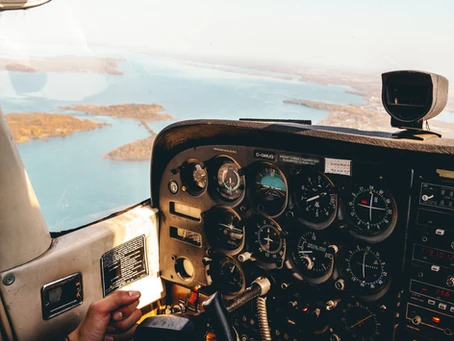Why Flying Yourself is Worth The Investment
by Tomas Peralta
3 min read ·

Travel is amazing. There’s nothing as enchanting as arriving at a brand-new destination, ready to explore unfamiliar landscapes and cultures. The commute there, however, doesn’t tend to be so great. Dealing with flight itineraries, layovers, check-ins, and TSA lines adds unnecessary stress to what should be a relaxing vacation or productive business trip.
So what if you could avoid that? More and more people are learning how to fly a plane, not just as an exciting hobby, but as an investment in future travel opportunities.
Can you save money by flying yourself?
In the long run, yes. If you’re a very frequent traveler (we’re talking hundreds of flights a year), flight tickets can really add up. If that’s the case, it’s pretty likely you’ll actually save some money by becoming your own pilot.
That being said, there are a few factors that go into the cost of flying a plane.
- Airplane Rental Cost
Assuming you don’t have your own aircraft, you’ll have to rent one. Here at Red Arrow, the cost of flying a plane averages to about $150 per hour, depending on which aircraft best suits your needs. If you’re having trouble figuring out the best planes to rent, call your local aircraft rental service and they’ll point you in the right direction.
- Travel Distance
In terms of flying yourself, short-term expeditions tend to be more affordable, especially day trips. Fuel consumption plays a huge role in the cost of flying a plane, as do airport fees and multi-day rentals. While the freedom and flexibility of being your own pilot is fantastic, it’s still important to plan ahead in order to account for these things.
- Party Size
Extra passengers mean a bigger plane, and a bigger plane will cost more money. Consider this when looking for the best planes to rent. Our Cessna 172’s seat four people, including the pilot.
There’s no straight forward answer to whether or not you’ll save money by flying yourself. Everything depends on your personal circumstances. Still, learning how to fly a plane is an investment that allows you to reap other incredible benefits overtime- Especially if you’re a frequent traveler.
Being Your Own Pilot: The Benefits
- You’ll avoid airport hassle.
Without the chaos of airport commuting, you can actually enjoy your trip. No TSA lines, no layovers, no check-ins, no running across the airport to catch a flight.
- You can be more flexible with your destinations.
When you fly yourself, you’re not limited to major commercial airports. You’ll be able to fly to more specific destinations via private runways, meaning you don’t have to worry about things like airport shuttles to nearby towns.
- You’ll be in complete control of your own schedule.
Whether this means maximized vacation moments or a super adaptable business schedule, learning how to fly a plane means you won’t have to adhere to unpredictable and inconvenient commercial flight agendas.
- It’s great for business.
Doubling as a pilot is a great opportunity for any business person. Your skills are sure to impress any number of clients, especially when you display your extreme dependability by making impromptu out of town meetings. Plus, your flying expenses could be written off on taxes or reimbursed by your company.
Are you interested in becoming a pilot?
The advantages to getting your pilot certificate are nothing short of life changing. At Red Arrow Flight Academy, we offer exceptional flight training to safely and efficiently help you achieve your goals. Give us a call at (575) 201-6160, or contact us via our website.
Reach Out Today